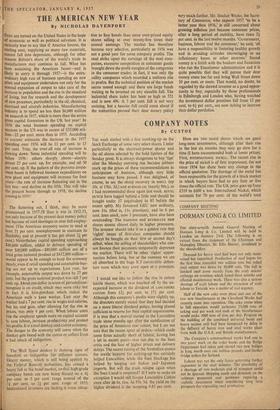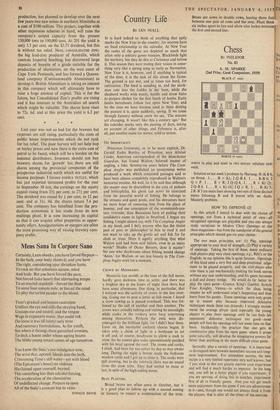COMPANY NOTES
By CUSTOS Tut week started with a fine marking-up on the Stock Exchange of some very select shares. I refer particularly to the electrical-power hares and the oil shares selected by the bold tipsters of the Sunday press. It is always dangerous to buy 'tips' after the Monday morning rise because jobbers mark up the prices of these recommendations in anticipation of business, although very little business may have passed. I was delighted, of course, to see the sharp recovery in SHELL (up 10s. at 156s. 3d.) and BURMAII OIL (nearly 90s.), as 1 had recommended these again last week. ROYAL carrot have lagged behind a little and should be bought under 17 (equivalent to 85 before the recent split). My favoured GEC new ordinary, now 31s. (that is, 11s. premium), and its 6 per cent. loan stock, now 3 premium, have also been outstanding: The PARSONS and REYROLLES new shares mount almost daily to higher premiums. The investor should take it as a golden rule that 'rights' issues of first-class companies should always be bought on their first or second day's abut, when the selling of shareholders who can- not finance their payments temporarily depresses the market. There will be other 'rights' oppor- tunities before long, but at the moment we are all absorbed in the huge ICI convertible deben- ture issue which may even open at a premium.
* *
I would not like to follow the rise in cotton textile shares, which was touched off by the un- expected increase in the dividend of LANCASHIRE COTTON from 121 per cent, to 171 per cent. Although this company's profits were slightly up, the directors merely stated that they had decided on a more liberal dividend policy, having placed sufficient to reserve for their capital requirements. It is true that a revival started in the Lancashire trade some months ago after the stabilisation of the price of American raw' cotton, but I am not sure that the recent spurt of orders—which made some firms actually short of labour, having lost a lot in recent years—was not due to the Suez crisis and the fear of higher prices and delivery delays. The recent raising of the Australian quotas for textile imports for making-up has certainly helped Lancashire, while the Suez blockage has helped by keeping out Indian and s Japanese imports. But will the trade relapse again when the Suez Canal is reopened? if I were to make an exception I would still favour Lancashire Cotton even after its 6s. rise. At 35s. 3d. the yield on the higher dividend is the tempting 9.85 per cent. Here are two metal shares which are good long-term investments, although after their rise in the last six months they may go slow for a time (I have recommended both at lower prices). First, INTERNATIONAL NICKEL., The recent rise in the price of nickel is of first importance, for not since 1954 has there been any change in the official quotation. The shortage of the metal has been responsible for the growth of a black market in which buyers have had to pay four or five times the official rate. The UK price goes up from £519 to £600 a ton. International Nickel, which accounts for 70 per cent. of the world's total , production, has planned to develop over the next few years two new mines in northern Manitoba at a cost of $100 million. This project, together with other expansion schemes in hand, will raise the company's output capacity from the present . 130,000 tons to 190,000 tons. At 201 the yield is only 3.3 per cent. on the $3.75 dividend, but this is without tax relief. Next, CONSOLIDATED ZINC, the big lead-zinc producer of Australia, which controls Imperial Smelting, has discovered large deposits of bauxite of a grade 'suitable for the production of aluminium, on the west coast of Cape York Peninsula, and has formed a Queens- land company (Com/monwealth Aluminium) to develop it. British Aluminium is taking an interest in this company which will ultimately have to raise a huge amount of capital. This is for the future, but Consolidated Zinc's profits are rising and it has interests in the Australian oil search which might be valuable. The shares have risen to 72s. 6d. and at this price the yield is 6.2 per cent.
Last year was not so bad for the brewers but expenses are still rising, particularly the costs of public house improvements which do not rank for tax relief. The poor harvest will not help hop or barley prices and now there is the extra cost of petrol to be faced, which will be a burden on the national distributors. Investors should not buy brewery shares, for 'growth' but , there are still shares among the provincial companies, of the prosperous industrial north which are useful for income purposes. I favour JOSHUA TETLEY, which has just reported increased profits for the year to September 30 last, the earnings on the equity capital rising from 23-1- per cent. to 27+ per cent. The dividend was raised by # per cent. to 12 per cent. and at 31s. 9d. the shares return 7.4 per cent. The company has benefited from the pro- duction economies it has made from its new maltings plant., It is now increasing its capital so that it can acquire other properties as oppor- tunity offers. Amalgamations or mergers are often the, most promising way of raising brewery com- pany profits.















































 Previous page
Previous page